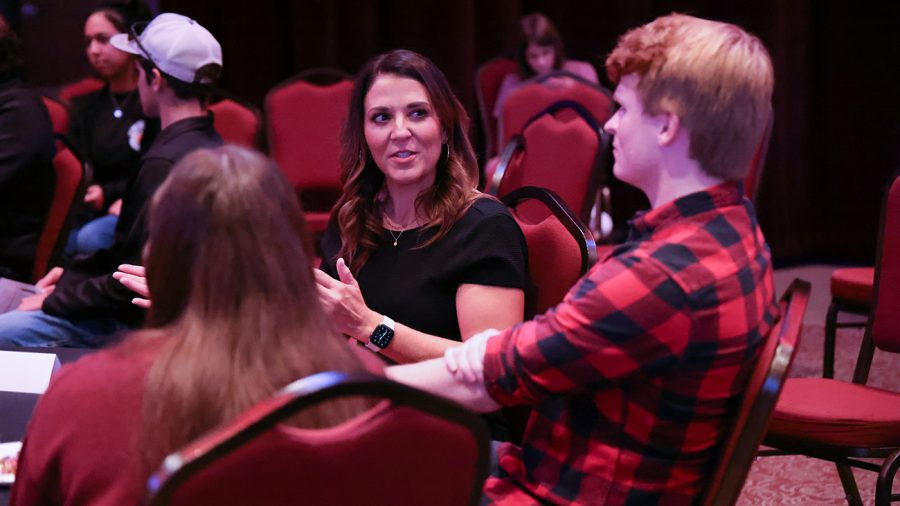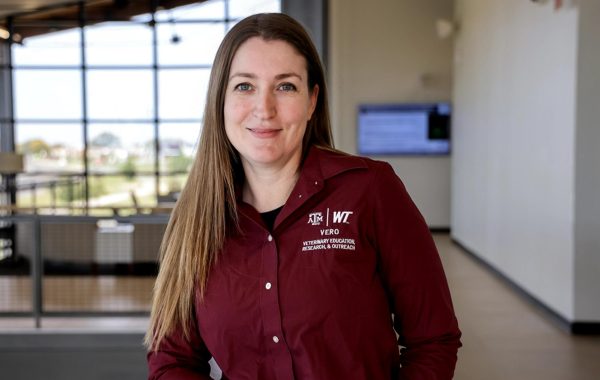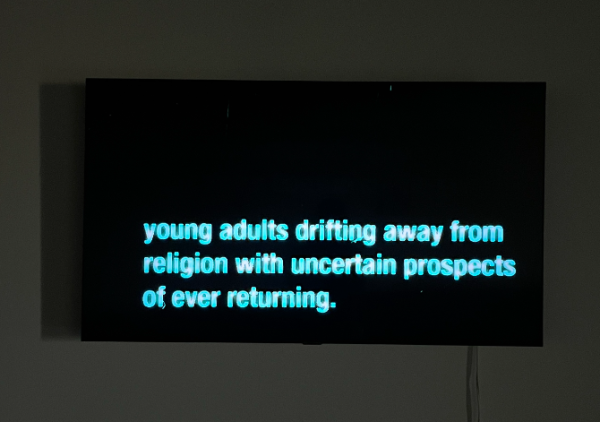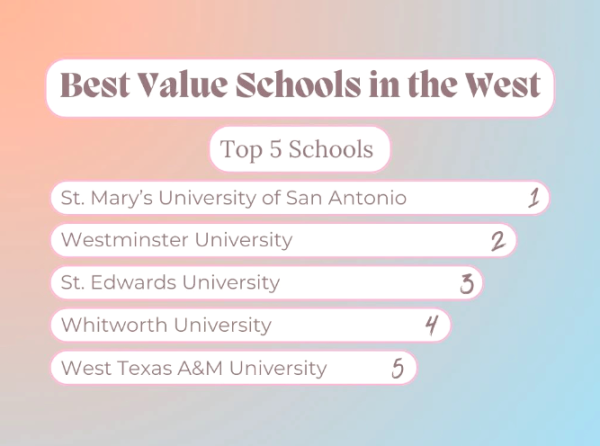Jon Mark Beilue: So you want to be your own boss?
New entrepreneurial studies give WT students the toolbox
After the last of the free pizza had been inhaled and washed down with soft drinks, and the five entrepreneurs had given a brief summary of their business, the formal part of the recent “Meet the Local Entrepreneurs” roundtable had concluded.
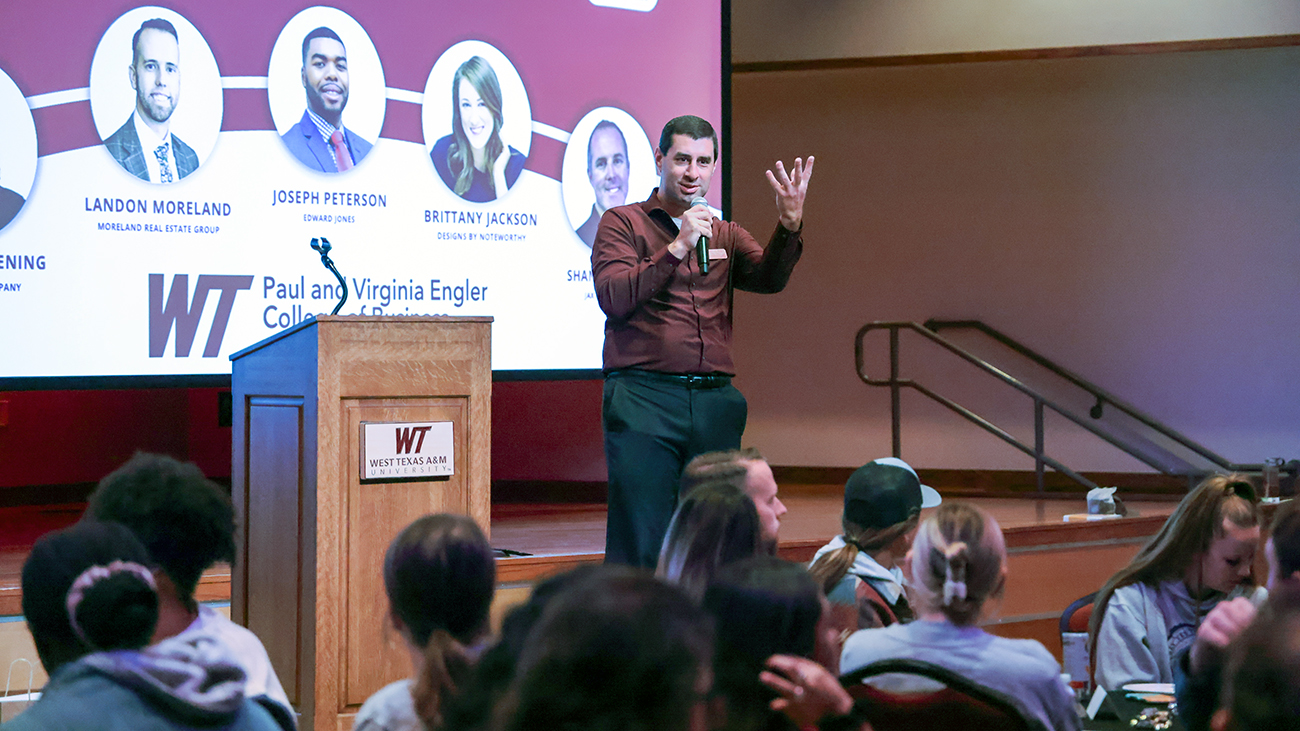 Photo: Dr. David Howe, assistant professor of management, welcomes a packed house of business students to a “Meet the Local Entrepreneurs” roundtable discussion in October.
Photo: Dr. David Howe, assistant professor of management, welcomes a packed house of business students to a “Meet the Local Entrepreneurs” roundtable discussion in October.
Dr. David Howe, assistant professor of management at West Texas A&M University, gave about 200 students in Legacy Hall in the Jack B. Kelley Student Center an out if they were looking for one. But if they wanted to stay, they could sit at one of five tables and pick the brains of the local business owners.
Most college students would usually head for the exits. But on this occasion, hardly any left. Students hung around to pepper the five with questions. Probably the least surprised by that was Howe.
He started a small business management class at WT five years ago. Dr. Neil Terry, who’s now provost and executive vice president for academic affairs, was the dean of the Paul and Virginia Engler College of Business at the time and was among those who wasn’t sure if the sections would fill up. But he was willing to give the course a chance.
Howe teaches three sections a year, two in the fall and one in the summer. It’s been full, 150 students in every section, for five years. Nary an empty seat.
“If that’s not evidence alone of the interest in owning your own business, then what is?” Howe said. “I talk to my students regularly about what you might do and how you might do it, and for almost every single of them—they may not go on and start their own business—but it’s in the back of their minds.
“It’s core. Many students think, ‘I could do that. I have this idea in the back of my head. Could I or couldn’t I?’ About one-third of my students leave my class saying that you taught me I never want to do this. The other two-thirds say, ‘You know what, I get it. I can see the potential path here. I could be my own boss.’”
To fulfill what seems to be a growing interest, WT has launched a revamped course of study in the Engler College of Business. “Entrepreneurship and Small Business Management” is a bachelor of business administration degree that began this semester.
“So when we first started to revamp the program,” Howe said, “we talked to other entrepreneurs, and they said you can’t teach a degree in entrepreneurship. You either have it or you don’t. But then I asked them, what about the skills, the tools? Did you know how to read a balance sheet? Did you know about supply chains? The answer was, ‘You know, you’re right.’
“What we really need to equip students with is not tell them here’s the silver bullet to start a business, but here’s the tool box,” Howe continued. “If you want to go into real estate, here’s the tool box you’re going to need to be a successful real estate agent. This degree is about expanding that toolbox, allowing students to fit their degree to their future needs as a potential entrepreneur or small business owner so they can be more successful in the future.”
Corpening: Take risks and don’t accept ‘no’
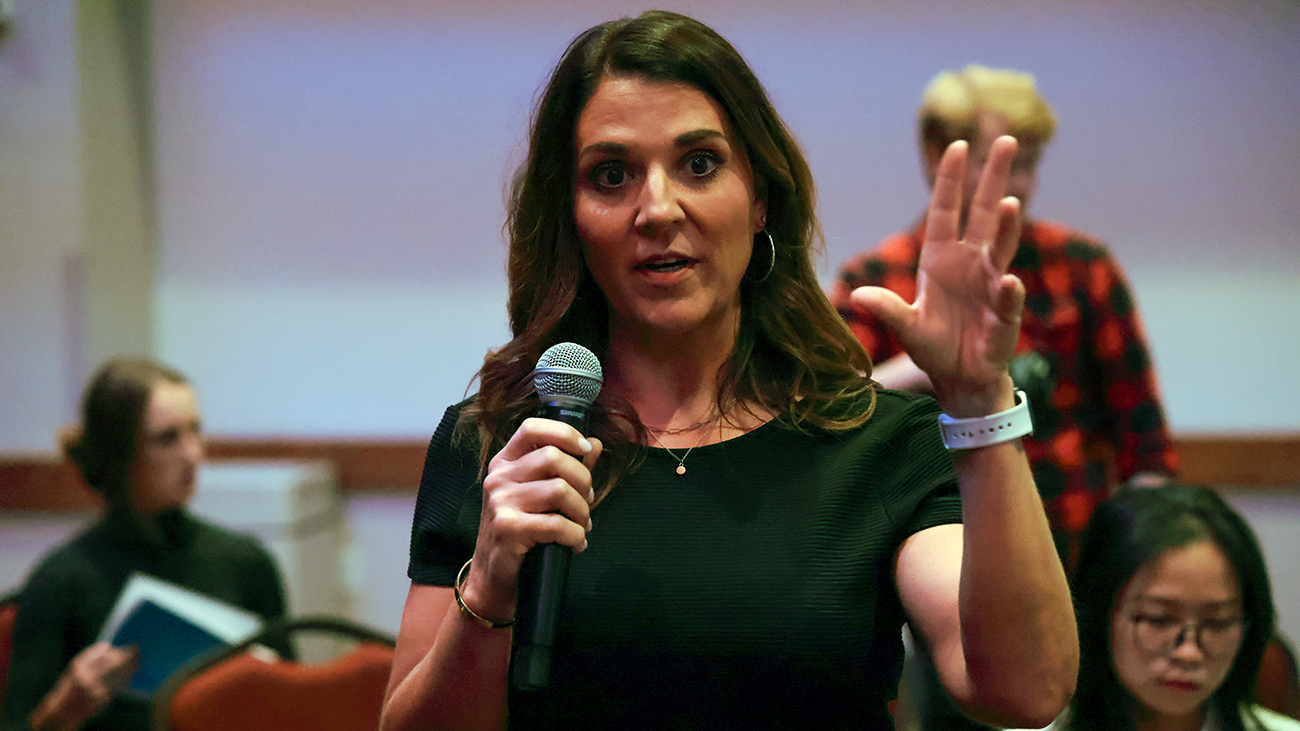 Photo: Angela Corpening, a WT graduate who owns Golden Light Cafe, Golden Waffle Co. and Golden Light Beer and Wine Garden, tells her success story to students at the “Meet the Local Entrepreneurs” roundtable discussion in October.
Photo: Angela Corpening, a WT graduate who owns Golden Light Cafe, Golden Waffle Co. and Golden Light Beer and Wine Garden, tells her success story to students at the “Meet the Local Entrepreneurs” roundtable discussion in October.
At the conference, Angela Corpening was one of five invited entrepreneurs. She was joined by Landon Moreland of the Moreland Real Estate Group, Joseph Peterson of Edward Jones, Brittany Jackson of Designs by Noteworthy, and Shane Redline of Jax Transport.
Twenty-two years ago, Corpening was a sophomore paying her way through WT by waiting tables and bartending at the Golden Light Café on Sixth Street. The oldest restaurant in Amarillo opened in 1946, and 60 years later, the then-owner wanted to sell. An ownership group, which included professional golfer Ryan Palmer, was about to make the purchase, but it fell through at the last minute.
“I was so afraid that someone was going to take the restaurant and change it,” Corpening said. “It’s the neatest place in Amarillo. It has all this history.”
Corpening, at age 26, had a radical idea, one that had bubbled inside her since she was much younger. She wanted to own her own business. Specifically, she wanted to buy the Golden Light. Using skills learned at WT, she wrote up a business plan. Now all she needed was a business loan.
Corpening went to a bank and was told no. She went to another – no. Another – no. No. No. No. No. No. No. No. No. No. No. No. No. No. No. No. No. No. No. No. No. No. No. Twenty-five times she was turned down.
Corpening was living two things she passes on as advice to college students.
“You have to be willing to take a risk,” she said. “Everything you do as an entrepreneur is taking a risk. And don’t give up. You can’t take no for an answer.”
On her 26th attempt, Alex O’Brien of Bank of Commerce said yes, and she bought the Golden Light. That was in 2006, the same year she earned her bachelor’s in accounting and finance from WT and got married.
“It takes a deep drive within a person,” Corpening said. “It’s just a certain personality you have to have, and not everybody has it.”
Sixteen years later in the most competitive industry in Amarillo, the Golden Light is still a Sixth Street mainstay. But that wasn’t enough for Corpening. With that entrepreneurial risk-taking in her veins, she has launched two food/beverage businesses in the last two years.
She opened the Golden Waffle Co. at 6017 Hillside during the pandemic in 2020, and in 2021, opened the Golden Light Beer and Wine Garden at 6014 S. Western.
“I thought Amarillo needed a breakfast place, and I wanted to see if I could do it on my own,” Corpening said. “I bought one that was already established. I wanted to see if I could build one.
“It’s a cutthroat business. The margins are small right now—the smallest they’ve ever been. I told these students about The Golden Waffle. I’m still in the first five years, and it takes five years to establish a restaurant. I still don’t know. It’s going great, but you just don’t know.”
Corpening has 37 employees— “37 personalities I dance through every day,” she said. At a time where hourly wage help is hard to keep for long, she has not had to make many new hires at the Golden Light Café in eight years.
Corpening earned her MBA from WT in 2011. She likely would have been among the 200 students in Legacy Hall had such a specific study been available 20 years ago.
“WT gave me the courage to do it, the capacity to believe I could do it,” she said. “I use my degree every single day in some way.”
Do you know of a student, faculty member, project, an alumnus or any other story idea for “WT: The Heart and Soul of the Texas Panhandle?” If so, email Jon Mark Beilue at [email protected]



